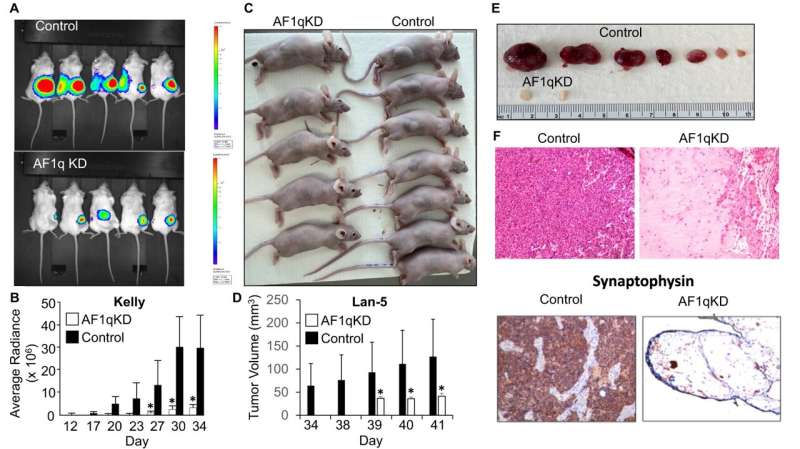This article has been reviewed according to Science X's editorial process and policies. Editors have highlighted the following attributes while ensuring the content's credibility:
fact-checked
peer-reviewed publication
trusted source
proofread
New pediatric cancer marker: Hope for a treatment target

Researchers have newly identified a universal, essential biomarker for the childhood cancer neuroblastoma—and a potential new target for treatment.
Neuroblastoma accounts for 15% of all pediatric cancer deaths and is the most common source of childhood tumors outside of brain cancer. The disease develops in early nerve tissue, usually in and around the adrenal glands, and typically affects children under age five. High-risk cases have a five-year survival rate of just 50%.
Led by UC San Francisco, researchers suspected the oncoprotein AF1q, which is known to play a role in leukemia and solid tumor progression, might be important in tumors of neural origin too. They used the Broad Institute's Cancer Cell Line Encyclopedia database to compare AF1q gene expression—that is, whether and how the gene is used to make cancer proteins—in 37 different types of pediatric and adult malignancies.
The researchers also used the "Depmap" Cancer Dependency Map database to analyze the impact of gene silencing (i.e., preventing gene expression) and gene editing of different cancer cell lines.
AF1q, they found, was expressed at the highest levels in neuroblastoma compared to all other tumor types. Neuroblastoma cells were also more reliant upon AF1q than any other cell line. And when they silenced AF1q in neuroblastoma cells, it appeared to initiate cell death and weaken the progress of tumors. Results were published in Oncogene.
The key to how AF1q works in neuroblastoma, said Julie Saba, MD, UCSF pediatric oncologist and senior study author, appears to be its ability to maintain high cellular levels of N-myc, another oncoprotein which is linked to high-risk neuroblastoma.
"N-myc has long been considered an 'undruggable' target in neuroblastoma," Saba said. "But now we see AF1q as a potential Achilles heel we can use to destabilize that target."
Future studies will focus on determining how AF1q interacts with other cellular proteins and then using that information to target AF1q's actions in cancer cells.
More information: Babak Oskouian et al, AF1q is a universal marker of neuroblastoma that sustains N-Myc expression and drives tumorigenesis, Oncogene (2024). DOI: 10.1038/s41388-024-02980-y


















